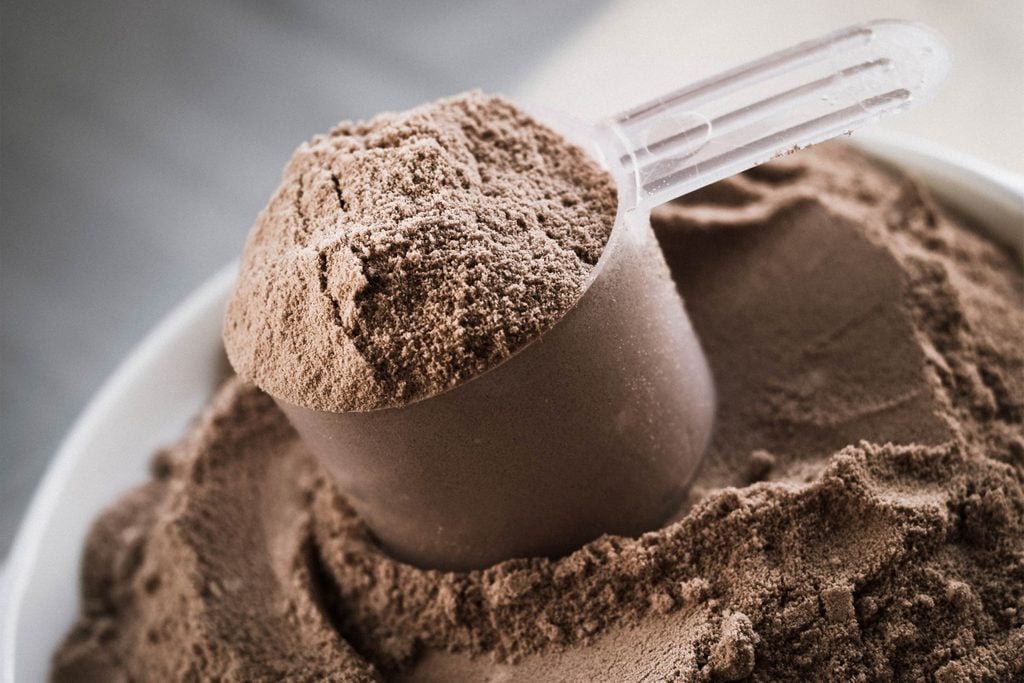Thinking of Taking a Protein Powder? 7 Tips to Finding the Best One for You
Updated: Mar. 06, 2017
Buying a protein powder can be overwhelming, considering how many options are out there. Make it easier with these must-follow pointers.

Protein powder shopping can be stressful. Walk into any health food store and you’ll be met with floor-to-ceiling shelves filled with jugs of protein powder in plenty of flavors and described in terms you probably don’t know. Once you know the protein basics, though, it’s really quite simple to choose. William Suggs, a personal trainer in New York City and a licensed sports nutritionist, shares his tips on how to find the best protein powder for you.
Figure out what your goals are
“It’s important to know that all proteins are not created equal. You can technically try any of them, but they all do different things,” says Suggs. Narrow your selection by identifying why you want to add protein powder to your diet in the first place. Are you trying to lose weight, build muscle, or just sneak in extra nutrients?
If you’re trying to lose weight…
…you may consider using a protein shake as a meal replacement or healthy snack option. In that case, look for one that is labeled “concentrate.” “These digest slower, so you get the satiety of a meal with the benefits of increased protein,” he says. Concentrate powders contain a high percentage of protein but with added carbohydrates, minerals, water, and fats. If weight loss is your goal, avoid mixing with anything but water. “Adding milk or yogurt is just increasing the calories and digestion time,” says Suggs. “Optimize the taste by using a shaker cup with a little ice and water. This helps break down the clumps pretty well.”
Fuel your workout with isolates
“An isolate protein powder is good before and after working out because your body will digest it faster. It delivers proper nutrition to fuel your workout and help you recover afterward,” he says. “When you exercise you’re breaking down muscle tissue, which is being fueled by that protein powder you had before.” That’s why isolates are especially good for toning and building muscles, because the protein is absorbed and useable by the body fairly quickly. Designer Protein has been in the protein powder game for 25 years, and recently debuted a native whey isolate powder that has a whopping 32 grams of protein per scoop, as well as amino acids, to really activate those muscles.
Give your diet a boost with casein
Casein is a slow digesting protein (it can take between six and eight hours to fully digest!), so this powder is frequently taken right before bed. “You can take it at night when you sleep and you won’t have that extremely full feeling in your stomach,” says Suggs. This is also an option is you’re really trying to bulk up your muscle mass—since your body absorbs the protein while you slumber, you’ll have a jumpstart on your daily protein intake as soon as you wake up the next morning.
Find your favorite type of protein
Just like there are different types of protein powders, there are also different types of protein that make them up. Whey is a milk protein and one of the most common; it contains all the essential amino acids, which boost energy and can even reduce stress, according to the Cleveland Clinic. You can also choose soy protein, a dairy-free option that has benefits beyond the gym (it helps reduce high cholesterol, supports bone mass, and can even ease symptoms of menopause in women). Other plant proteins are pea and hemp; Vegan Smart makes a line of protein and other nutritional shakes that are completely plant-based. Burt’s Bees has a new protein powder line that gives you a blast of protein plus added nutrients (like full servings of fruits and veggies or gut health support). Here’s how to eat more protein without even trying.
Read the whole nutrition label
Once you’ve identified the type of powder and protein you like, don’t forget to read the entire nutrition label. “Pay attention to the fat and sugar content. Many powders also use artificial sweeteners, which you’ll see on the ingredient list,” says Suggs. It’s a good idea for everyone to choose a powder that’s low in fat and sugar, but diabetics should be especially mindful of the sugar content and any other ingredients that may affect blood glucose levels. People with irritable bowel syndrome should choose a powder without artificial sweeteners or lactose sugars.
Don’t drink too much
Whether you’re striving for a smaller waist or bigger muscles, chugging protein shakes isn’t the answer. (Find out the silent signs you’re having too much protein.) “You can’t drink protein shakes all day, every day because the protein is absorbed quicker than if you were to eat meat or another food form of protein,” says Suggs. “If you can’t digest it all, it’ll turn into fat. Don’t exceed 20 or 30 grams in one sitting.” Stick to the serving size and be mindful of how much protein you’re ingesting throughout the day.